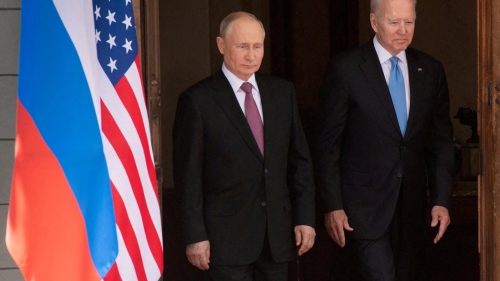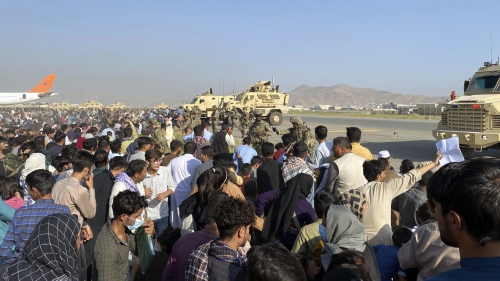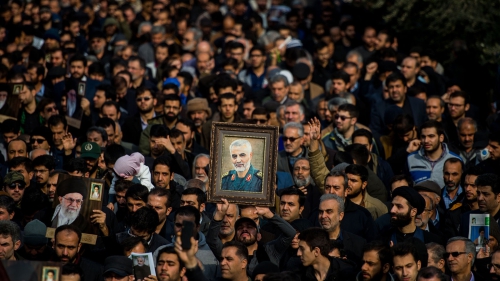Shia-Sunni Nausea
 |
23 November 2006 was the bloodiest day in Iraq since the invasion and occupation of that land in March 2003. 202 people were killed in a Shiite stronghold, allegedly by Sunni suicide bombers. The Shiites who are the majority retaliated by massacring at least 18 Sunnis.
This tit for tat Sunni-Shiite violence has been going on for some time now. It took a turn for the worse with the bombing of a sacred Shiite shrine in Samarra on 22 February 2006. Sectarian violence has become so bad that many fear Iraq may further spiral into an uncontrollable blood bath.
What is the primary cause of this violence? Is it rooted in Sunni-Shiite doctrinal differences that go back to the early decades of Islam or is it the consequence of more recent political developments in Iraq?
It is true that a dichotomy developed between those who accepted the line of caliphs that emerged after the Prophet Muhammad's death and those who felt that the Prophet's cousin and son-in-law, Ali Ibn Talib, was his rightful heir. The former came to be known as the Sunnah wal Jamaah (Sunnis) while the latter are referred to as the Shiites. This dichotomy became more pronounced after Ali's assassination in 661 A.D. Various political developments and economic trends in different parts of the Muslim world exacerbated the situation.
The tussle for power and influence between the Safavid Empire in Iran and the Ottoman Empire in Turkey in the sixteenth and seventeenth centuries was a case in point. It had a direct impact upon Shiite-Sunni relations in Iraq. The Safavids who had made Shiism the official religion of Iran sought to control Iraq largely because of the tremendous religious significance of Karbala and Najaf. The Sunni Ottomans, on the other hand, were afraid that Shiite teachings would spread to Anatolia (Asia Minor) and wanted Iraq to remain a sort of buffer state.
Iraq, then known as Mesopotamia, first came under the sway of the Safavids in the early part of the sixteenth century, before it was conquered by the Ottomans, after which it was retaken by the Safavids and then finally it was recaptured by the Ottoman Ruler, Murad 1V in 1638. This was the beginning of continuous Ottoman power over Iraq which lasted till the early decades of the twentieth century. It entrenched a Sunni minority, 20% of the population, over a Shiite majority. There were acts of discrimination by the Sunni elite against the Shiite population which further widened the chasm between the two Muslim communities. But there is no evidence at all of wholesale massacres of Shiites under Ottoman rule.
 |
Even after the imposition of British colonial rule in Iraq following the Sykes-Picot Agreement in 1916, there was no record of organized sectarian violence which pitted Sunni against Shiite, though latent animosity remained. This was also more or less the situation in independent Iraq from the monarchical period to the Baathist era. Even under Saddam Hussein's harsh and tyrannical rule which witnessed the suppression of all forms of dissent, Sunnis were targeted as brutally as Kurds and Shiites, there was no Sunni-Shiite bloodletting on any scale, comparable to what is happening today.
On the contrary, Sunnis and Shiites had forged political alliances on a number of occasions in the last 90 years or so. In 1920 for instance when the Iraqi people chose to resist British occupation, the Shiites were supported by the Sunnis. In 1948, in the al-Wathbah uprising against the British, the Sunnis and Shiites displayed a remarkable degree of solidarity. We should also not forget that in the Iraq-Iran War between 1980 and 1988, the vast majority of Shiites stood by their Sunni leader, Saddam Hussein, against Shiite Iran. Arab nationalism proved to be a much stronger force than sectarian religious loyalties. At the social level too, in spite of sectarian differences, there has been a great deal of Shiite-Sunni interaction in Iraq's modern history.
According to certain sources, 30% of marriages in Iraq until the 2003 United States' led invasion, were between Shiites and Sunnis. A largely secular society up to the late eighties, the Iraqi middle and upper classes were often oblivious of their Sunni-Shiite, or for that matter, Muslim-Christian affiliations.
How did all this change so dramatically in the last few years? Some of the masterminds behind the US occupation of Iraq were convinced that the only way to eradicate Saddam's influence upon Iraqi society was to strengthen the Shiite majority and to weaken the Sunni minority which they regarded as the dictator's power base. It was not surprising therefore that they consciously embarked upon the classic colonial policy of 'divide and rule'.
Paul Bremer, the second American Consul in Iraq, in particular was ruthlessly efficient in driving a wedge between Shiites and Sunnis through his political manipulations and administrative machinations.
In more specific terms, for the Sunnis two events in 2005 spelt their political doom. The new Iraqi Constitution adopted in October gave much of the authority over oil to the Shiite and Kurdish regions and Sunnis living in areas where there was no oil felt that their future was in jeopardy. The Election in December which boosted the political power of the Shiites and Kurds was perceived as a monumental defeat for the Sunnis. The anger and frustration arising from these two events, a direct result of the occupier's policy of playing Shiites against Sunnis, expressed itself in the Samarra massacre of February 2006.
Since then, groups within the regular Iraqi military and police and private militias and brigades from both the Sunni and Shiite communities have embarked upon an orgy of violence. For many Sunnis, Shiites are "traitors" who have "betrayed the covenant of Allah and the Prophet" by siding with the occupier. It is the fact of occupation that bestows Sunni attacks upon Shiites. It should be emphasized that a significant segment of Shiites such as the Sadrists are also vehemently opposed to the US-led occupation. Indeed, a survey undertaken by the respected World Public Opinion (WPO) in September 2006 shows that 74% of Shiites and 91% of Sunnis want the occupiers to leave within a year. Both groups " believe US forces are provoking more violence than they are preventing and that day-to-day security would improve if (they) left".
This then is the solution to Sunni-Shiite violence as the Iraqi people themselves see it.
Dr. Chandra Muzaffar is the President of the International Movement for a Just World (JUST).
Related Suggestions
The side effect of that above--stated policy was indifference.
2.Because they are Slavs; and being Slavic is not just language, but a root ethnicity (an ethnicity that pre--existed creation of nations).
3.Greatest killing of the World War II of neighbor by neighbor did occur when Ukrainians murdered 40,000 Polish Civilians, and in an attempt at retribution, the Poles killed between 10,000 to 20,000 Ukrainians.
4.The ancient Slavic--style served--called, sometimes after 3 to 4 generations and sometimes not even in a direct line (great grand uncle), vendetta was exacted on only so few Polish Jews by Poles because under the circumstances, the nazi prosecution and the Holocaust, it was viewed even by the fellow Slavs, in this particular case Poles, as dastardly.
5.Under the circumstances, even the Polish Fascist Underground, estimated at 15% of the total number of the Polish Underground Fighters (the Polish Home Army, even before other Polish Underground groups joined just before the Warsaw Uprising in 1944, constituted well over half of all the Polish Underground) did help the Jews that they considered to be Polish patriots (nota bene: many moderate Zionists were Polish patriots or at least appeared to be; since, to achieve their aims they were trying to reach out to others--this meant not just speaking Polish well, but foreign languages as well); however, most especially in the part of Poland that was under the Soviet rule after September 1939, they did execute on their own the Jews whom they suspected of aiding the Soviet authorities in the deportation of Polish families to Siberia.
Chandra Muzaffar has my respect.
And what beautiful calligraphy, mashallah!
I would like to thank Dr. Chandra Muzaffar for a very lucid recollection of historical events particularly in Iraq. It's heartening to note that Sunnis and Syiahs had united in their struggle against the British in the 1920's. Infact this article should be an inspiration to all. Dr. Chandra had put pieces of history together, one which the " present world powers that be " do not want Muslims to know. History I believe, should not be look upon merely from the decks of foreign colonial ships but also from the local shores.
Yes, I agree with my other Muslim brothers that Rasulullah ( s.a.w. ) is not a Sunni or a Syiah. The Prophet ( peace be upon him ) is a Messenger of GOD and he preaches ( I use present tense ) the Oneness of One GOD and calls upon mankind to believe in the Day of Judgment too.
But we are divided today into Sunnis and Syiahs by the events and happening of history. While we cannot at all erase history and remove it's consequences, but we can shape the future history of the ummah by being united. We can do this on all fronts. Our learned scholars from both sides can meet in the table of Muzakarrah and in the spirit of ukhwah. Our leaders can forge better undestandings among nations.
The present conflict in Iraq now between Sunnis and Syiahs are caused by human greed. It has nothing to do with the aqidah or iman. Both Sunnis and Syiahs are fighting for economic and political reasons.
As for the Sunni, they are fighting because of worries that they would be sideline in the administration of the country and that most of the oil producing areas are in Syiah territories. As for the Syiah they are propelled by vengeance, on the cruelties and injustice that Saddam Hussein had inflicted on them earlier. But let me ask the Iraqi Muslims, does all these makes you better than your occuppiers ? Does it ?!
Thank you again Dr. Chandra for a very well informed and truthful piece. May ALLAH B
This was a very enlightning article. I agree whole hearted with this brother. It is so sad that the people in Iraq cannot see the real enemy. That our brothers and sisters hate one another so badly, that they cannot see the real devil!!! As an African-American, we know all about the divide and conquer techniques used by the occupiers. They did the Slaves in the US the same way. The enemy knows exactly what they are doing. They could care less about the Iraqi's, whether sunni or shia, who are dying each and every day. Shatan is sitting back and laughing!! As one brother stated, the more we are divided, the weaker we are. Do you not think that these folks know that?
I feel sick everytime I hear that Muslims are dying in high numbers in Iraq. We have got to learn to live and love eachother. The Umah needs to stop letting these folks divide us. This is one solution to the problem. The next one, is for us to sincerely turn back to Allah, and the ways of the last Prophet (pbuh).
one more article of ignorance in islam.org. (:^").
Was Prophet Muhammad (PBUH) a sunni or shia?
We are Muslim first and foremost.
Salaam
If we read the Quran and the lessons Allah subhana wa ta'ala has put it in we see that as muslims today we are making the exact same mistakes Allah has mentioned of others therein. Was Abraham, Isaac, Ismail, Noah, David, Solomon, Jesus, and Mohammad aleyhom salam sunni or shiah? They were muslim, and our religion, according to Allah, is that of Abraham. All those prophets were the prophets of Islam. Please, let us not be stuck in politics, history, and nationalism. Please, let us open our hearts to Allah and let go of these layers of complexity that have only taken us away from the truth. Let us submit to Allah and not to our egos nor to our cultural traditions nor to our nations, but to Allah alone and to all of us as brothers.
And thank you for this article.
Asalamo aleikom wa rahmat Allah wa barakato
If we read the Quran and the lessons Allah subhana wa ta'ala has
put it in we see that as muslims today we are making the exact
same mistakes Allah has mentioned of others therein. Was
Abraham, Isaac, Ismail, Noah, David, Solomon, Jesus, and
Mohammad aleyhom salam sunni or shiah? They were muslim,
and our religion, according to Allah, is that of Abraham. All
those prophets were the prophets of Islam. Please, let us not be
stuck in politics, history, and nationalism. Please, let us open
our hearts to Allah and let go of these layers of complexity that
have only taken us away from the truth. Let us submit to Allah
and not to our egos nor to our cultural traditions nor to our
nations, but to Allah alone and to all of us as brothers.
Asalamo aleikom wa rahmat Allah wa barakato
If we read the Quran and the lessons Allah subhana wa ta'ala has
put it in we see that as muslims today we are making the exact
same mistakes Allah has mentioned of others therein. Was
Abraham, Isaac, Ismail, Noah, David, Solomon, Jesus, and
Mohammad aleyhom salam sunni or shiah? They were muslim,
and our religion, according to Allah, is that of Abraham. All
those prophets were the prophets of Islam. Please, let us not be
stuck in politics, history, and nationalism. Please, let us open
our hearts to Allah and let go of these layers of complexity that
have only taken us away from the truth. Let us submit to Allah
and not to our egos nor to our cultural traditions nor to our
nations, but to Allah alone and to all of us as brothers.
Asalamo aleikom wa rahmat Allah wa barakato
well it is rightly pointed out that it has no where in the Quran referenced to shai or sunni muslim. but there are lot of things which has been referred in Quran but in practice it is highly violated.
Mr Bashir, this is just a diplomatic stand of the US government to gain control over Iran oil reservoir. even if sunni muslim has the majority they would have done the same thing. so it is not the people who is fighting it is the control who makes them fight.
rest pray to god that people of Iraq will turn to follow the saying of Allah through Quran.
Allah Akbar.

















